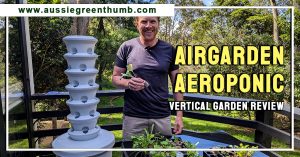It’s easy to get overwhelmed by irrigation systems, so we’ve put together this guide on irrigation kits, and irrigation tools for gardens that should hopefully demystify the idea of automatic watering.
We’ll be talking about the different types of irrigation, the benefits of irrigation systems, and when and where you need irrigation systems, as well as ways to save money and water with garden irrigation kits.
More...
Top Pick

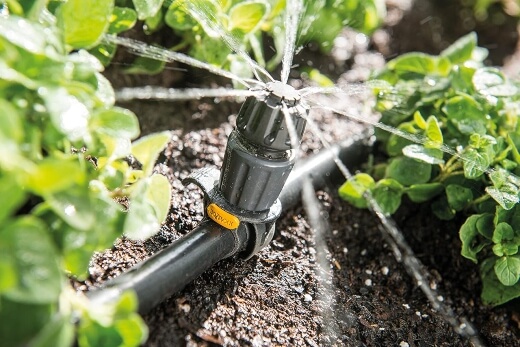
Best Value

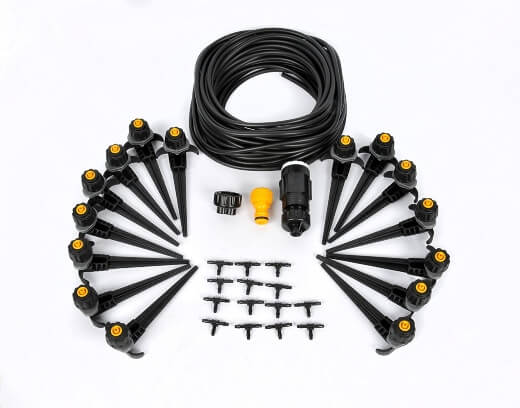
Best Garden Irrigation Systems for 2025
Product | Our Rating | Price | |
|---|---|---|---|
1. Hozelock Easy Drip Universal Irrigation Kit |  |  | |
2. Hozelock Easy Drip Micro Watering Kit for Pots and Containers |  |  | |
3. Raindrip Automatic Irrigation Kit |  | ||
4. Pope Garden Bed Irrigation Kit |  | ||
5. Gardena 13002-20 Drip Irrigation Kit with Water Computer |  | ||
6. Rainpoint IK10MV Mist Cooling Irrigation Kits for Garden | 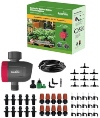 | ||
7. UCIN Automated Drip Irrigation Kit with Timer | 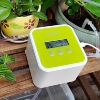 |
Guide to Garden Irrigation Systems
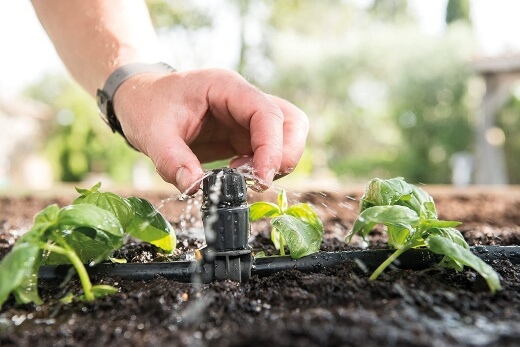
For most of Australia, dry spells are inevitable at some point in the year, and they can be devastating for your crops, lawns, and borders.
Keeping our soil watered usually means walking up and down the garden with watering cans, or pulling hoses around every corner, and for bigger gardens you might be out there every day trying to stop your veggies from drying out.
The benefit of irrigation kits is that they take the work out of watering, and most modern kits are automatic and work on timers of moisture sensors, which make it even easier than traditional irrigation.
In this guide I’ll be looking at tried and tested systems, kits and traditional methods (which can be a great way to make the most of rainwater without spending a penny), but first I want to talk about how they actually work.
How Does Irrigation work?
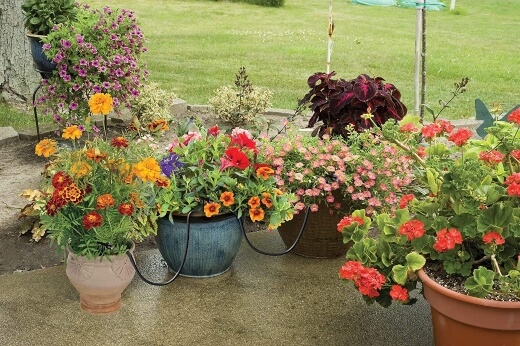
Irrigation, in the most basic way, redirects water from one place to another. Traditional systems used reservoirs and canals to lift water from below the water table.
In Australia, this differs in-land from coastal areas, where soil saturation tends to follow rivers and lakes rather than usual sea level. If there are any natural springs in your area they give a great indication on the water table level.
The reason irrigation is important is because in gardens, you’re creating a miniature ecosystem, where the soil saturation depends on soil type and whether you have raised garden beds.
You can dig wicks into the ground which will carry water to raised beds from deeper in the soil, but this won’t stop them drying out on the hottest days. Water systems for gardens use tap water, or water butts to move water around the garden to where they are needed.
Some simple systems like soaker hoses for irrigation can be incredibly efficient, especially when buried and set up from a low-pressure water butt, but can over saturate soil with high pressure.
The most efficient way is to set a timer when you connect an outdoor tap to irrigation kits. This way you’ll reduce the risk of overwatering, and can set the time based on how much water you need, whether you’re making an irrigation kit for veggies, or for garden beds.
Buyer’s Guide to Irrigation Systems for Gardens
Why do I need an Irrigation system?
Well firstly, it means you can do away with using your hose. Sure, watering can be somewhat therapeutic and good for the mind, but it also takes a long time, can be very inefficient, and puts all the responsibility on you to remember to do it.
Different Types of Garden Irrigation Systems
1. Drip Irrigation
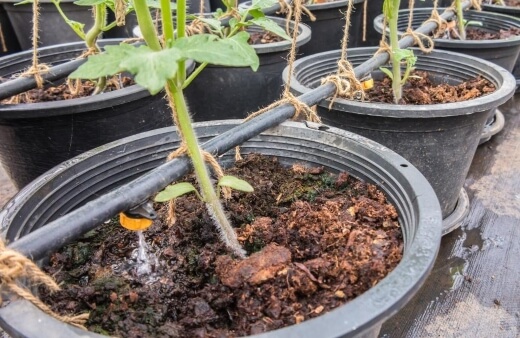
Drip irrigation typically involves a precise, controlled release of water, at or around the plant’s root system. The benefit of drip irrigation is that you are targeting water where it is needed, rather than wetting the entire bed.


Get Your Free Guide:
Master Growing Australian Natives eBook
A Must Have Complete Guide for Every Australian Garden
Get Your Free Guide:
Master Growing Australian Natives eBook
A Must Have Complete Guide for Every Australian Garden
This way you can cut down on water use, and any water the plant doesn’t use will simply ebb out into the rest of the bed, enough so it doesn’t dry out, but not enough that you are wasting water.
Installing PVC pipes with pressure gauges and flow control valves is at the core of many drip irrigation systems. In a standard drip irrigation set up, pipes with holes drilled into them are either buried or run near the base of plants in well-defined rows.
This approach helps to more efficiently direct where the water is going and prevents a significant amount of the water evaporation problems associated with flood irrigation methods.
Employing the use of drip tape to safely distribute a steady supply of water to a large number of plants, all at the same time, helps to demonstrate why drip irrigation is an efficient, cost effective way to save water while transporting critical moisture to the plants of a garden.
2. Spray Irrigation
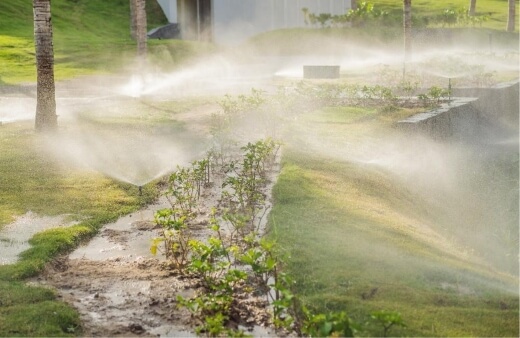
The early approach to spray irrigation arose as people used garden hoses with spray nozzles to distribute water over lawns and gardens.
As spray irrigation became more advanced, the idea of poking holes in the side of hoses and walking about in a circle, to evenly distribute the water, became a popular way to irrigate large areas of property while saving time.
Today, machines, metal frames and long tubes are used in center pivot style spray irrigation systems to cover even larger areas of crops. An alternative method of spray irrigation is to use hanging pipes adapted with holes to spray water over large areas.
If a row of plants is confined to a small area, such as near the perimeter of one side of a house, then it is possible to install rotating sprinklers to spray water on the desired area for efficient water exposure.
3. Basic Irrigation
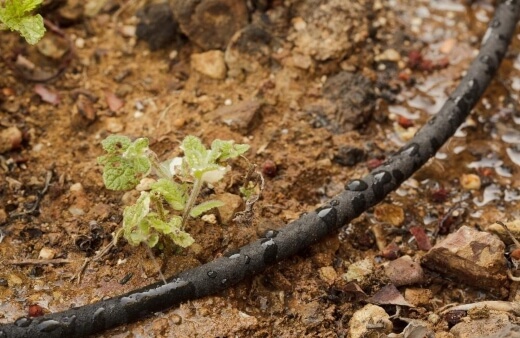
The transportation of water from one place to another is a central theme in most irrigation systems. Since the invention of the bucket, people have spent countless hours carrying water to the crops in their fields.
To give basic irrigation its proper title, furrow irrigation, is a method of irrigating using the power of water itself, requiring no pressure, and no manual watering.
The modern alternative to furrow irrigation is soaker hoses, which work particularly well in greenhouses, and will work equally well from a water butt filled with rain water or grey water, to save using tap water.
Grey water irrigation refers to irrigation by water that is generally reused from residential or commercial sources which is free of faecal matter – so used bath water (if soaps are non-toxic), or rain water run-off, which can harvest from drain pipes directly into barrels or water butts.
Garden Irrigation Reviews
1. Hozelock Easy Drip Universal Irrigation Kit

Hozelock is the most trusted irrigation brand in the world. Their Universal irrigation kit can be adjusted for high pressure spraying at water point, and connects to the garden tap with no fuss at all.
It might not come with an automatic timer, but sometimes that’s ok, as it gives the gardener more control of their veggies, and means you can respond to the weather each day.
Pros
Cons
2. Hozelock Easy Drip Micro Watering Kit for Pots and Containers

Another purpose made irrigation system from Hozelock, which far exceeds a lot of their competitors. I prefer drip irrigation to spray irrigation as it targets water where it is most needed without waste.
This is particularly important on leafy plants and squashes, where watering leaves during the day can leave sunburn and mildew.
Not only is this garden drip irrigation kit from Hozelock easy to set up, every drip nozzle has an adjustable flow, so for plants that require less moisture, you can control the watering for every pot.
Pros
Cons
3. Raindrip Automatic Irrigation Kit for Containers and Hanging Baskets
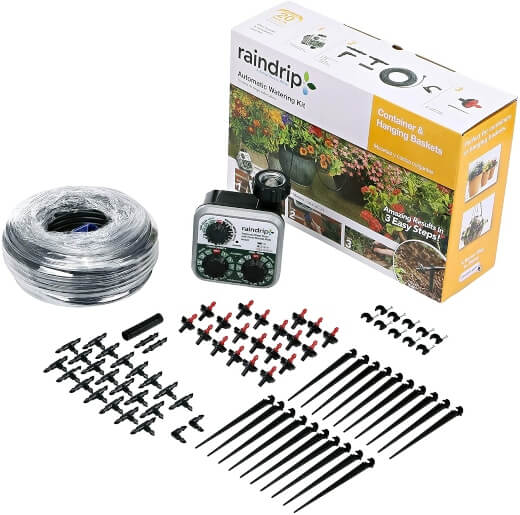
One of the fastest things to try out in your garden is hanging baskets, typically needing water 2-3 times per week to prevent them becoming completely bone dry. Hanging basket irrigation kits are a great way to make the most of your rainwater as they can be permanently attached to a tap on a water butt.
This garden irrigation kit from Raindrip has a battery powered automatic water time, which opens its valve to let exactly the right amount of water out each day. It can be set up from a tap, but the pressure from your water butt will push water through easily.
Pros
Cons
4. Pope Garden Bed Irrigation Kit
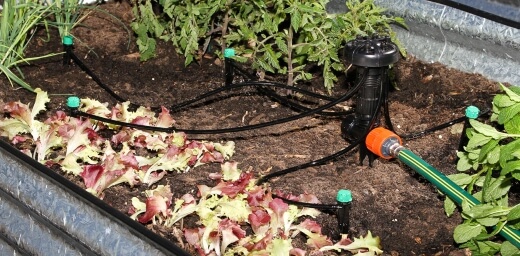
Many people just wish there was a simple, DIY option for some of their irrigation needs. Well, the good news is, there is! I was recently afforded the opportunity by the trusty people at Pope to check out one of their new products, a raised garden bed irrigation kit and I was very impressed.
Pope Irrigation does a great range of irrigation kits, but you can build your own bespoke kits from parts, really quite easily. Their drip irrigation kits are easy to clean, resistant to blockages, and easy to set up.
Pope Irrigation kits are perfect for raised beds, and can be customised to include spray irrigation on the same line as drip irrigation, making one hose work for the entire garden.
Pros
Cons
5. Gardena 13002-20 Drip Irrigation Kit with Water Computer
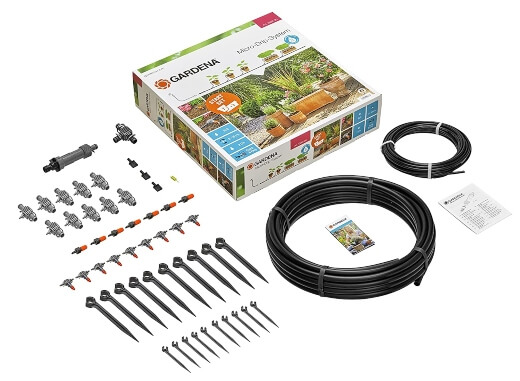
From an ease of use perspective, Gardena produces one of the most durable irrigation kits that includes a water computer. The fully customisable watering timer, allows full control of hour by hour watering so you can easily look after your garden when you’re away from home.
The system will work ok from a water butt but is best connected to an outdoor tap for the added pressure.
Pros
Cons
6. Rainpoint IK10MV Mist Cooling Irrigation Kits for Garden
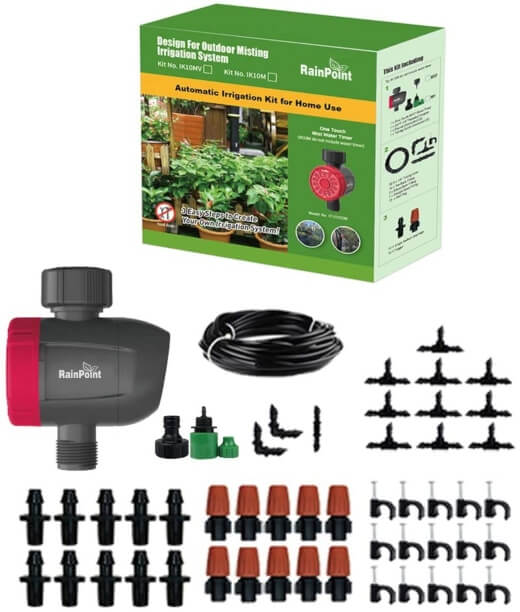
I admit that mist irrigation might seem unnecessary in most gardens, but of all the irrigation kits in this article, this is the one I would buy. We have two greenhouses in our backyard, one for veggies, and one for tropical plants that need as much control as possible, including humidity.
Usually, just a shallow tray of water will humidify the greenhouse enough, but this kit is incredibly easy to set up, and comes with 10 fogger nozzles for mist irrigation of tropical plants. It’s also great to use on the patio to cool down the area on a really warm day.
Pros
Cons
7. UCIN Automated Drip Irrigation Kit with Timer
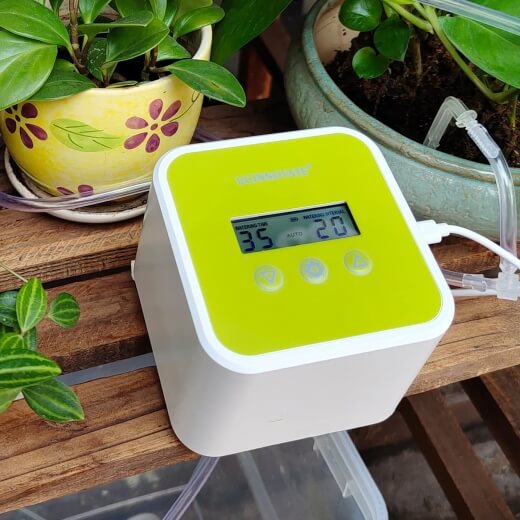
This neat little kit from UCIN is for indoor use only, so it’s great for houseplants in the greenhouse, but not useful in the garden.
It isn’t as well built as other brands so needs to be set up carefully and out of reach of children and pets. But it’s a great way to water an indoor garden with no effort at all.
It can be charged by USB, or used when it's plugged in, so never needs recharging.
Pros
Cons
Best Garden Irrigation Systems Australia
Best Garden Irrigation for 2025


Hozelock’s Easy Drip Universal Irrigation Kit is an outstanding bit of kit, capable of watering up to 10m2 of garden, or pots, with an easy to install spike system, with ten sprinkler nozzles that easy push into the rubber hose.
The hose is supplied with standard fittings to attach to the mains water tap and can be used alongside automatic watering systems or by itself for manual operations. Because it’s such a standard system, it’s effective for use in lawns, borders or pots - basically anywhere you can imagine needing it, it works.
Hozelock products typically outlast other hoses too, so rather than a hose with a ten year lifespan, this should last for at least 12-15 years making it excellent value for money overall too."
Best Value Garden Irrigation


There are two things I love about the Hozelock Easy Drip Micro Watering Kit for Pots and Containers; one, it’s Hozelock, so I have no reservations in recommending it; and two, it’s price.
Hozelock can be a really expensive brand to buy as the world leader in irrigation products, but this neat drip irrigation system is perfect for irrigating pots and hanging baskets, and can be used alongside Pope garden irrigation systems to automate the system.
Types of Professional Irrigation Systems
If you’re after professional irrigation systems, many of the products above will be sufficient for watering greenhouses, or crops, but when it comes to agriculture, size matters.
The basic parts included in the products by Hozelock, Pope Irrigation and Orbit would easily provide the tools for watering, but if you need to cover a large crop, durable, in ground pipe is needed, and for greenhouses, overhead sprinkler systems are the most efficient methods of irrigating large spaces.
Let’s take a quick look at different types of professional irrigation systems, and where to use each one:
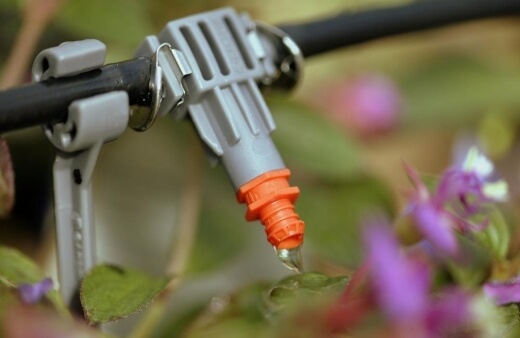
Professional Spray Irrigation System
The big difference between professional irrigation systems and domestic spray irrigation systems is the tubing. Most agricultural sites will have irrigation pipes set up in grids, suspended at least 1m over crops.
By raising the spray irrigation over the ground, you increase their coverage, and reduce the risks of wildlife chewing through pipes, or machinery damaging any irrigation tubing.
Professional Drip Irrigation System
Professional drip irrigation is really only suitable for greenhouse growers using professional staging. Otherwise the nozzles tend to get in the way.
Drip irrigation in commercial greenhouses can be incredibly effective, without any need to manually water any crops when a water source is available.
Drip is the most efficient professional irrigation system too, using less water and targeting the roots of crops, which will give you huge reductions on any water bills.
Professional Mist Irrigation System
Poly-tunnels are great spaces for growing all sorts of veggies, whether you’re a professional grower or an enthusiastic amateur. They also have an accessible framework to fit mist irrigation to in every tunnel.
It’s the easiest irrigation system to install for most agriculturalists too, as you can quickly run lengths of cheap pipe along the overhead bars, and tie them in with cable ties.
Attaching misting heads at regular intervals makes an easy professional irrigation system.
Garden Irrigation Systems Frequently Asked Questions
What are the types of irrigation?
There are seven common types of garden irrigation: drip irrigation, centre pivot irrigation, lateral move irrigation, localised irrigation, manual irrigation, sprinkler irrigation, sub-irrigation, and surface irrigation.
Which system of irrigation is best?
Drip irrigation is the best type of irrigation for water conservation and overall efficiency, using less water, with less pressure to water gardens all year round. However, drip irrigation requires regular maintenance and can cost more in the long run.
Which irrigation system is cheapest?
Soaker hoses, or surface irrigation are the cheapest to buy, and to operate, using less water, on easily controllable timers, with effective watering directly at ground level.
What are the disadvantages of irrigation?
Full garden irrigation systems are costly, can oversaturate the soil, and can often waste water through wind or evaporation depending on the system you use. Despite these disadvantages, most Australian gardens will benefit from regular irrigation, and irrigation kits have more pros than cons.
Can I install my own irrigation system?
Most irrigation systems are easy to install yourself at home, but some underground irrigation systems, or timer irrigation systems can be complicated to install, and can cause leaks and water damage to property if installed incorrectly.
If you are ever unsure, leave water and piping work to professionals.
What is the easiest form of irrigation?
Spray irrigation and sprinkler systems are by far the easiest form of irrigation for any garden. They are less effective and have higher water waste, but they can be installed in minutes and are reasonably affordable.
Is an irrigation system worth it?
Irrigation systems are invariably worth the money you spend on them. Cheaper systems can offer a quick solution, particularly for short-term watering needs, but more expensive systems will last longer and provide more efficient and more effective watering for your whole garden, rather than just a lawn, or vegetable patch.
How can I water my garden for 2 weeks on vacation?
If you plan on taking a 2-week vacation, make sure to set up a proper irrigation system in advance, especially if you’re going away in summer, when your garden will take a battering from the heat.
Either use a DIY soaker irrigation system, using rain water, or water butts, or set up a manual timer from your outside tap to automatically water the garden at set times of day.
How deep should irrigation lines be buried?
Irrigation lines should be buried at least 1.5 times the depth of a spade, so 1 ft or more. Obviously, spades and garden forks will damage irrigation lines underground, but also, burying them further will help to protect water-filled irrigation lines from frost and heat expansion.
How much should a simple irrigation system cost?
A basic irrigation system should cost around $200. Adding underground lines and installation will add another $500 to that, and the more complex your system, the more costly it can become, with some garden irrigation systems costing up to $3000.
What is a major issue with irrigation?
Waterlogging your soil is a major issue with garden irrigation systems, but it’s not the fault of the system itself, and is usually due to poorly installed timers, or over use of the system.
Make sure you know your garden, and the local climate, and set the timer so your garden gets enough water, but not too much.
What is the best irrigation system for uneven land?
Sprinklers are the only practical option for irrigation in hilly or bumpy sites where underground pipes can be hard to install neatly, and soaker hoses struggle with pressure uphill. While you will get some wasted water, your system will last a little longer.
Below are additional garden and watering tools we've tested along with our recommendations:
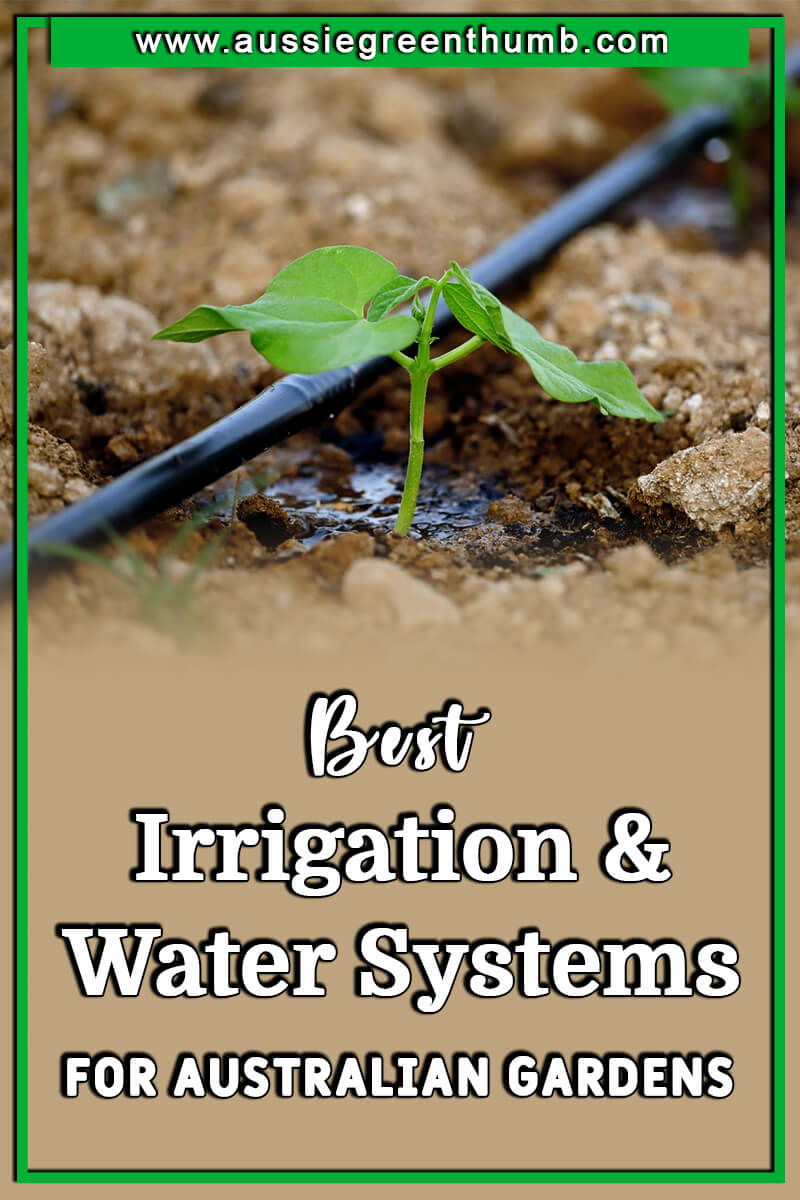
Wrapping Up Our Garden Irrigation Systems Guide
Choosing irrigation systems for gardens has to be defined by what you’re growing. However big, however small, there is an irrigation system for your garden. If you’ve got an allotment garden, and are exclusively growing veggies, then a drip irrigation kit is perfect because it reduces water use, and targets watering directly.
If it’s large colourful beds and borders, then you need a soaker hose. The even distribution of water gets every drop into the soil. For lawns, invest in a good spray irrigation kit, which will evenly water your lawn.
For those of you with more specialist collections, maybe try a mist irrigation kit to help raise humidity in enclosed spaces. Whatever you decide, I hope this guide to garden irrigation systems has been useful.
Published on January 23, 2023 by Gary Clarke
Last Updated on December 23, 2025




